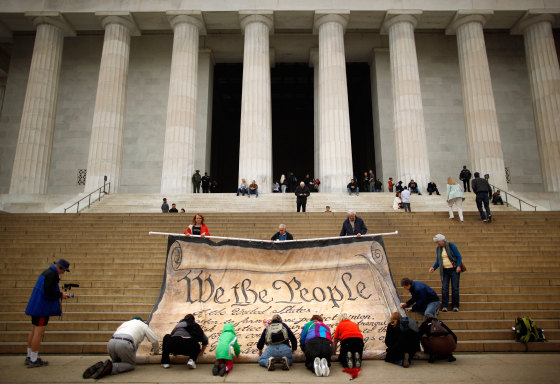Ten years ago Tuesday, the Supreme Court issued its decision in Citizens United v. FEC. In the majority opinion, Justice Anthony Kennedy dismissed concerns that opening our politics to unlimited corporate spending would corrupt our elections.
“The appearance of influence or access... will not cause the electorate to lose faith in our democracy,” Kennedy wrote. With that reasoning, four other justices joined him in gutting our campaign finance laws.
Kennedy, and the majority of the Supreme Court, was wrong.
In the majority opinion, Justice Anthony Kennedy dismissed concerns that opening our politics to unlimited corporate spending would corrupt our elections.
Polling consistently shows that Americans’ faith in our democracy is shaken. For example, one 2017 survey by think tank Center for American Progress found that 84 percent of respondents think that government works for special interests — not for the people — and 89 percent believe that Congress works to benefit financial supporters instead of constituents.
The toxic influence of money in our elections touches every issue we face as a nation. And makes it harder to solve problems by empowering special interest groups. For example, over 90 percent of Americans want stronger background checks for gun purchases and 7 out of 10 want action to respond to climate change, but money in politics is a big reason why we can’t get it done.
We’ve seen over the past decade how quickly and effectively wealthy individuals and corporations were able to overcome the remaining limitations on campaign spending. As it turns out, forbidding coordination between candidates or parties and super PACS does little to safeguard our electorate from limitless money from corporations, non-profits, labor unions and other associations. And it hasn’t stopped people from losing faith in our system, either.
We’ve seen staffers rotating between campaigns and the super PACs with which they are forbidden from coordinating, candidates playing tag team with super PAC leaders to make exorbitant fundraising asks, video footage posted by campaigns for outside groups to pick up for their own ads, and foreign money laundered through phony corporations to illegally infiltrate American elections.
Candidates and operatives from both political parties are exploiting the system. And the American people, Republicans and Democrats alike, are sick of it.
Since coming to Congress just weeks after Citizens United, I have made strengthening our democracy one of my top priorities in Congress. As vice chair of the House Democracy Reform Task Force, I joined with my Democratic colleagues to pass the For the People Act last January. The bill is now stalled in the GOP-held Senate.
Our legislation could only go so far. Ending Citizens United requires a Constitutional amendment. That is why Rep. Jim McGovern, D-Mass., Rep. Jamie Raskin, D-Maryland and Rep. John Katko, R-N.Y. and I introduced the bipartisan Democracy for All Amendment in the House in January of the same year.
In this time of extreme polarization, overturning Citizens United may seem an unrealistic fantasy. But support among the American people is sky high.
In this time of extreme polarization, overturning Citizens United may seem an unrealistic fantasy. But support among the American people is sky high. In 2018, the University of Maryland reported that 81 percent of Americans from both parties supported the idea of an amendment limiting election spending. In addition, over the past 10 years, 20 states and many more local governments have passed resolutions in support of an amendment to get money out of politics.
At town hall meetings, even the most conservative voters have told me they want money out of politics. And it’s clear why bipartisan majorities of the American people are concerned. Over the past decade, the 10 families who spent the most in our elections — just 10 — spent a total of more than one billion dollars, according to the Center for Responsive Politics. In fact, Citizens United has helped prompt an increase in money in politics, tilting the balance away from average Americans and toward the wealthiest donors.
Unlimited spending by corporations and billionaires doesn’t make elections fairer or protect free speech; it skews the playing field and diminishes the free speech rights of American voters. As Justice Stephen Breyer warned in his 2014 dissenting opinion in a case that further weakened campaign finance laws, “Where enough money calls the tune, the general public will not be heard.”
Citizens United, and the cases that followed, corrupted our elections by elevating the interests of billionaires and corporations above the concerns of American voters. Ten years later, we must advance our fight to put voters back in charge of Washington and restore the faith of the American people in our democracy.

